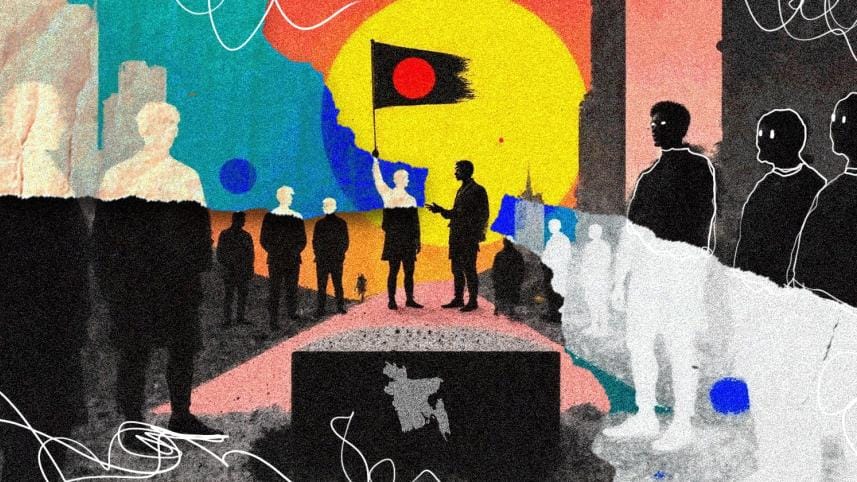Towards a common minimum reform programme

The ousting of an oligarchic regime and the subsequent formation of an interim administration have unearthed deep-rooted structural crises in Bangladesh. The challenges are omnipresent, with declined investment, sluggish economic growth, and growing public dissatisfaction. The deposed oligarchy failed to control inflation. This cost-of-living crisis disproportionately impacts working-class and marginalised communities. The manufacturing and service sectors are paralysed by policy uncertainty, while the banking sector struggles with liquidity shortages. Investors are reluctant to commit capital in the absence of long-term policy commitments. The economy is contracting, plunging into recession.
The crisis is more than just economic; it is a reflection of a broken political system. The existing power structure, shaped by elite bargains and institutional distortions, has failed to establish a sustainable, inclusive democratic order.
At the heart of the problem is a flawed political settlement where vested interests dictate governance, rather than an inclusive and institutionalised democratic system. Economic policies benefit a politically connected syndicate, rather than fostering broad-based growth. Regulatory bodies, the judiciary, and financial institutions suffer from political influence that undermine their independence. The lack of genuine democratic competition has created a culture of impunity, where the rulers have ruled without the public mandate.
The interim government has inherited these contradictions. Without a legitimate political mandate, no administration can implement meaningful economic and institutional reforms. Bangladesh must define its governance model to serve the median population, rather than a privileged few. A new social contract—based on equity, democratic accountability, and economic justice—is essential to building public trust and ensuring long-term stability.
A free, fair and credible election is the only path to restoring stability, building confidence, and enacting real reforms. The urgency of an elected government is not a matter of political preference but also an economic necessity. Without legitimacy, any country risks stagnation, institutional decay, and growing public unrest.
The interim government constituted several reform commissions to address constitutional, electoral, and judicial issues, among others. While the proposals of these reform commissions sound promising, there is an urgency for an immediate consensus by following a max-min principle, i.e. consensus on a common minimum reform programme (CMRP) by a maximum of political parties as a second-best alternative. A prolonged transition—or a rigid stance on "reform first, elections later"—will only deepen the crisis. A CMRP agreed upon by the maximum number of political parties is necessary. The elements of CMRP could be on three key issues: a) peaceful transition of power; b) free, fair and credible elections; and c) representational public order.
Firstly, no political party in Bangladesh has successfully handed over power to another party, and this must change. Secondly, it must do away with the prevailing electoral system, which has hardly given voters credible alternatives to make informed and engaged choices in free, fair elections, without fear, intimidation or manipulation. Thirdly, and most importantly, the political parties must agree on a representational public order that safeguards against any rise of autocratic dispensation, including fascism, and instead ushers in a new political culture of ensuring accountability, with adequate checks and balances.
The 2024 July uprising has made it clear: Bangladeshis deserve an indigenous political settlement that reflects the will of the people, not a system built on patronage networks. The state must belong to the people. People have spoken against the culture of deinstitutionalisation and political centralisation. The deposed resource-dependent syndicate has eaten away at systems. The collusion between moneyed interests and political rulers have eroded institutions, making the citizen-state relationship a distant ideal. A nation cannot withstand external pressures if it is plagued by power asymmetry and rent-seeking elites who exploit state resources.
A political party, seeking a mandate, must present voters with a clearly articulated new social contract—one that shifts from oligarchic clientelism to a people-centric development. Any uprising, as history suggests, warrants an age of reforms of the state, such as a welfare state and universal social security. This means building strong, independent institutions, with checks and balances, dismantling patronage networks, devolving local governance, ensuring democratic accountability, and fostering participatory democracy. Some of these elements are also outlined by the reform commissions.
With public support, an elected government can go beyond the CMRP to undertake bold reforms that ensure rights, stability, and progress. A legitimate political mandate allows for redistributive policies that reduce inequality, institute universal social security, and ensure basic rights, capabilities and entitlements, including public provisioning of education, health and housing. Investors need policy certainty, which only a stable, democratic government can provide, and such, in turn, can ensure decent employment for all.
Bangladesh is at a historic turning point. The economic paralysis cannot be solved in isolation from the political crisis. Without democratic legitimacy, no government can restore economic stability or implement necessary reforms. The demand for free and fair elections is not just about political justice—it is an urgent economic necessity too. The country's future depends on democratic governance, where power is derived from the people, not from elite negotiations or external interventions. The time for action is now.
Dr Rashed Al Mahmud Titumir is professor in the Department of Development Studies at the University of Dhaka.
Views expressed in this article are the author's own.
Follow The Daily Star Opinion on Facebook for the latest opinions, commentaries, and analyses by experts and professionals. To contribute your article or letter to The Daily Star Opinion, see our guidelines for submission.




 For all latest news, follow The Daily Star's Google News channel.
For all latest news, follow The Daily Star's Google News channel. 


Comments